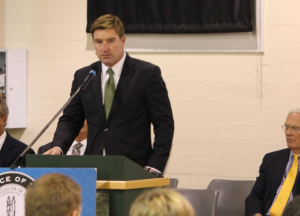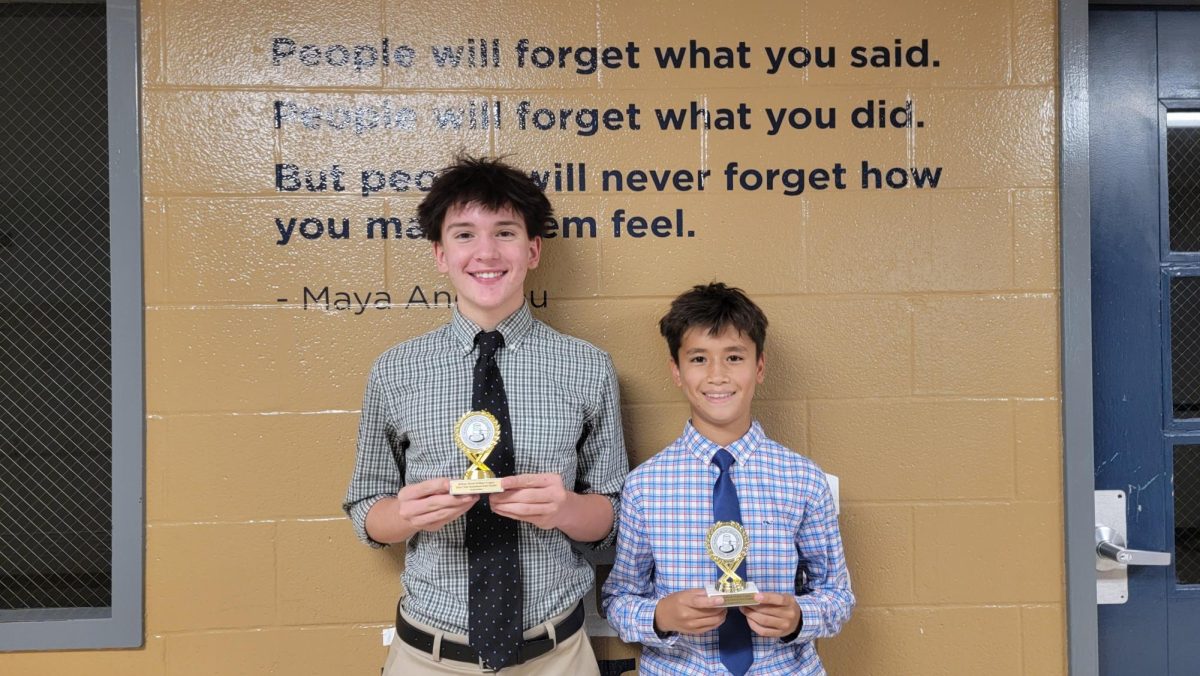
“You can be from Yale or jail, Park Avenue or park bench — alcohol and drugs don’t discriminate.”
With these words, Trinity Advanced Program counselor Dr. Aaron Striegel reminds his Issues in Drugs and Alcohol classes about the harsh reality of addiction. This reality increasingly involves drugs prescribed by doctors.
As prescription drug abuse rises in Kentucky and the rest of the nation, Striegel educates students about the drugs that have joined alcohol and marijuana in causing major problems. “Prescription drugs don’t discriminate. They affect people of all ages or social classes,” he said.
According to the National Institute for Drug Abuse, “prescription drug abuse is when someone takes a medication in an inappropriate way, such as without a prescription, in a way other than as prescribed for the high elicited.”
To warn students about the growing problem in the state, Striegel, counselor Steven Ferman, and other Trinity administrators asked Commonwealth Attorney General Jack Conway and others to speak to the Junior Class about the Keep Kentucky Kids Safe program.
In a stern voice, Conway told the juniors, “I want to talk you young men about an issue that affects nearly every family in Kentucky. It’s not just an eastern Kentucky problem. It’s not a western Kentucky problem. It’s not an urban or rural problem. It’s affected nearly every family I’ve met as I’ve traveled our nearly 120 counties.” Conway added that his family had been affected, too.
The number-one cause of accidental death in the United States today is from prescription drug overdose, Conway told students. Just because they come in a vial from a doctor, prescription pills are not for everyone to self-prescribe.
Why do students abuse prescription drugs and use prescriptions designed for someone else? Striegel said sometimes teens look for something stronger and more potent than drugs like marijuana. Prescription drugs can be easy to get, which doesn’t help the situation. Teenagers can take them from their parents, grandparents or friends — and even order drugs online, a method Conway said is very dangerous.
Even though they’re easy to get, prescription drugs can have deadly consequences.
“Three people will die in Kentucky today, if the statistics hold true,” Conway said. “We’re losing more people to prescription pill overdoses than to car accidents.”
Oxycodone, Codeine, Xanax, Vicodin, Lortab, ADHD medicines such as Vyvanse and Adderall, and other prescription drugs are commonly abused by teenagers.
Trinity junior Connor Gentry said, “(Conway) was showing and talking about how drugs can kill young teenagers. It changed my views of prescription drugs, because they can tear families apart. I didn’t realize how widespread of a problem it really is.”
During Conway’s presentation, a video played detailing the tragic deaths of 19-year-old Sarah Shay and 22-year-old Savannah Kissick, both of whom died from prescription drug overdoses. Both girls’ parents talked about the pain of losing a child.
Mr. Mike Donta, from Ashland, Ky., traveled with Conway to talk about losing his son, Michael, to a prescription pill overdose.
“I could’ve walked in this room a few moments ago, and my son, Michael, could be any one of you,” Donta told the juniors. “My son died July 12, 2010. My son wasn’t born to become addicted to prescription painkillers. He was just like you. Nobody’s exempt from the effects of drug abuse.”
Donta’s son’s drug addiction began at a skating rink senior year when a friend gave him a pill to try. Five years later he died from an overdose of OxyContin.
“Someday, somewhere, somebody’s going to offer you a pill,” Donta said. “I’d like you to just take a look at your friends beside you.”
Conway asked Trinity juniors: “Honestly, how many of you, either yourself or someone you know, has taken a pill not prescribed to them.”
Not as many raised their hands as Conway expected. He said, “Usually it’s about 75 percent.”
“If you’ve got a problem, somebody’s there willing to help you,” Donta said. “If you know somebody that has a problem, reach out to them.”
To combat the prescription drugs abuse problem in Kentucky, Conway continues to work with lawmakers and continues educating young people and parents through talks and the Keep Kentucky Kids Safe website.
Trinity continues working to educate students about the issues and dangers revolving around prescription drugs, Striegel said. In addition to talks like Conway’s, the school educates students through Freshman Enrichment, health, and Issues in Drugs and Alcohol classes. Additionally, messages about the dangers that drugs pose are broadcast on Trinity Television, included in letters sent home to parents, and discussed at meetings held for parents.
“School is for education,” said Striegel about the need to continue discussions at home. “We’re just a small segment. School can’t be an end-all for everything.”







